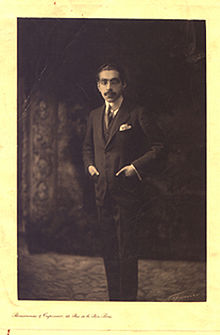Firouz Nosrat-ed-Dowleh III
| Firouz Nosrat-ed-Dowleh III شاهزاده فیروز میرزا نصرتالدولهٔ فرمانفرمایان سوم |
|
|---|---|

Nosrat-ed-Dowleh in his youth
|
|
| Foreign Minister of Iran | |
|
In office August 1919 – March 1920 |
|
| Monarch | Ahmad Shah Qajar |
| Prime Minister | Hassan Vosough od-Dowleh |
| Preceded by | Aliqoli Ansari (Moshaver ol-Mamalek) |
| Succeeded by | Asadollah Qadimi Navaei (Moshar os-Saltaneh) |
| Personal details | |
| Born | 1889 Tehran, Iran |
| Died | 1937 Semnon, Iran |
| Political party |
Revival Party Reformers' Party |
| Relations | Abdol-Hossein Mirza Farmanfarma (Father) |
| Children |
Mozaffar Firouz Lili Firouz Iradj Firouz Sharoukh Firouz |
| Religion | Shia Islam |
Prince Firouz Nosrat-ed-Dowleh III, (1889–1937) GCMG (1919) was the eldest son of Prince Abdol-Hossein Farmanfarma and Princess Ezzat-ed-Dowleh Qajar. He was born around 1889, and died in April 1937. He was the grandson of his name-sake, Nosrat Dowleh Firouz Mirza, and of Mozzafar-al-Din Shah Qajar through his mother Princess Ezzat-Dowleh.
Records are unclear, but the prince is purported to have been born around 1889. He was educated at the American University of Beirut and the Sorbonne in Paris. He spoke five languages (Persian, French, English, Russian and German) and attended Lycee Janson de Sailly in Paris and Institut Le Rosey in Switzerland. As surnames had not been established in Persia at the time of his studies in France, he registered himself as 'Firouz Firouz', using his grandfather's name as his surname. Afterwards, when the Persian government made having surnames mandatory by law, his father Prince Abdol-Hossein Farmanfarma picked the surname Farmanfarmaian for himself and his children. However, Nosrat-ed-Dowleh, one of his 23 brothers (also a son of Princess Ezzat-ed-Dowleh), and one of his 12 sisters (daughter of Princess Ahshami) held on to the surname 'Firouz' and became known as Firouz Firouz, Mohammad Hossein Firouz, and Maryam Firouz, respectively.
Minister of Foreign Affairs under Ahmad Shah Qajar; architect of the ill-fated Anglo-Persian Agreement (1919); candidate for accession to the Qajar throne after Soltan Ahmad Shah's exile and removal; in 1921, during the coup which brought Reza Shah to power he spent three months in the Qasr-e-Qajar jail with his father and younger brother Abbas Mirza Salar Lashgar while Reza Shah consolidated his power base. During his stay at the prison which he had helped build, he often boasted about its cleanliness. Nosrat-ed-Dowleh also translated Oscar Wilde's De Profundis during this time. Following his release he continued his public life for nine more years serving as a member of parliament, provincial governor, minister of justice, and minister of finance.
...
Wikipedia
